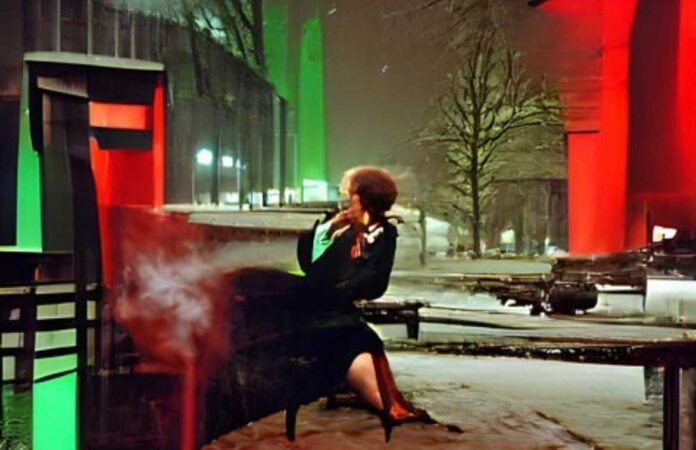Elliot Tuttle ‘22 said what began as a screenplay for a Media Arts & Culture class at Occidental turned into a narrative podcast that he wrote and directed completely independently. According to its description on Spotify, “Lina’s Song,” set in 1980’s East Berlin, follows trans femme performer Lina in her quest to get to a dream-inspired West Berlin club. Tuttle said the initial ideas for the story came from the song “Spacer Woman” by techno artist Charlie, and an accompanying drag performance.
“I would stay up late and dance to [the song] in the shower,” Tuttle said. “And then I watched this burlesque performance to the song.”
Tuttle said he felt a significant connection to the story, specifically in its representation of a queer main character with big dreams.
“Lina is really special to me because I see a lot of myself in her,” Tuttle said. “Feeling like I want this dream across the country and I have to be able to move out there myself and do it, things like that. So I think that was the exciting part — that the story is different from all our experiences, but we can find ourselves in characters.”
According to Tuttle, the podcast was headed up by notable executive producer Mark Duplass and starred several well-known actors — including actress Hari Nef.
“It was like a wish list of people we wanted,” Tuttle said. “Luckily, they all liked the script, so they all wanted to do it.”
Two other Occidental graduates were a part of the project as well, with Rachel Goldfinger ‘18 as producer and Danny McGrath ‘20 as the sound mixer and original songwriter. Tuttle said he and Goldfinger had worked together at Duplass Brothers Productions, an independent television and film company founded by Mark and Jay Duplass, and bonded over their time at Occidental.
“[Rachel] definitely had input, and I welcomed it,” Tuttle said. “We would go through the action of the script together, and she would be like, ‘Why don’t you write in this sound?’ It was really helpful in that way. I really love working with her.”
Goldfinger said she found Tuttle’s original script beautiful and was excited to begin working with him to turn it into a podcast.
“Elliot is one of the best writers I’ve worked with,” Goldfinger said via email. “I’m endlessly impressed with his ability to build such grounded, honest worlds through his characters.”
Tuttle said that switching from a film medium to a podcast medium posed a challenge for him as a director.
“Normally, I’d be directing [the actors] in their action and physicality,” Tuttle said. “But we would have rehearsals and I would say, ‘No, this line needs to be more like this,’ or I would ask the actors questions about how they think their character is feeling.”
In addition to the performance of the voice actors, music and background noise create the tone of the narrative, and McGrath said he was excited to set the scene.
“It felt like a really interesting opportunity,” McGrath said. “Elliot and Rachel put together all the scenes, then I did a pass on them. That was the process where I introduced the score, and introduced other sound effects to make the scenes a little bit more dynamic.”
Lina’s job as a singer is a unique aspect of the story that McGrath brought to life by drawing from his own musical endeavors. McGrath said that while these songs were written for the podcast, he still relates to them.
“The type of music I make myself is very confessional,” McGrath said. “I started music by sitting down at the piano and just singing and writing my own songs.”
The podcast features three parts that complete Lina’s story; however, Tuttle said he would be open to writing another project similar to this.
“A lot of what I write ends up having a queer lens, and it’s not even on purpose,” Tuttle said. “It’s just what I like to write about. So that’s the end of [Lina’s] story, but I wouldn’t rule out doing another [story] that is a queer historical perspective.”
Goldfinger said she hopes to see Lina’s story reimagined in a different medium some day, but is nonetheless very happy with how it turned out.
“While I do still have the dream — much like Lina — to see the story performed visually, either on film, TV, or stage, experiencing the world through its music and knockout performances from the cast really has been so rewarding,” Goldfinger said via email. “I’m so grateful Elliot trusted me with such a tender, experimental project about perseverance, self-actualization and courage and am very proud of this project.”
![]()































